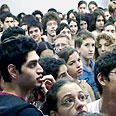
Israeli classrooms among world's most crowded
Middle school classes average almost 33 students per class; Education Committee chairman: scholastic achievement won't improve without classroom reduction
Israeli students study in some of the most crowded classrooms in the world, according to comparative study done by the Organization for Economic Cooperation and Development (OECD). Israel's education system received a dismal third-place ranking in terms of class size, with only classrooms in Japan and South Korea listed as more crowded on average.
This data was submitted Sunday in a report to Knesset's Education Committee Chairman MK Zevulun Orlev (Habayit Hayehudi) by an investigative team on the committee.
According to the OECD's study, there is an average of 32.8 students per class in Israeli middle schools, compared to an average of 23.8 in other developed countries. Israeli elementary school classes contain an average of 27.5 students, compared to 20.2 in other developed countries.
Classrooms at Arab schools are more crowded than those in other sectors. The most crowded of these are in Qalanswa, Qabul and Baka-Jat, holding 38 students per average classroom. Among the Jewish sector, schools in Ashkelon, Kiryat Bialik and Omer listed an average of 37 students per class.
"In crowded classrooms with 35 to 40 students, it's impossible to have class, and I'm not able to determine the academic level of each student until the exam itself," said a middle school teacher from Tel Aviv.
"There's no chance that I can give each student the attention he or she needs because most of the lesson, I'm dealing with discipline problems and trying to get people to be quiet," she explained.
Orlev to call emergency meeting
MK Orlev added that, "the conditions for Israeli students are actually worse than in Japan or Korea, which are more crowded, because in Israel the classes are heterogenous and the gaps between groups of students are very large."
As things stand, Orlev said, schools receive funding based on number of students, such that it is 'cost effective' to have more crowded classes.
"Improving teacher quality and increasing study hours without reducing the number of students per classroom will not lead to improved scholastic achievement or an amelioration of the drastic situation of the Israeli educational system," he said.
He announced that he intends to call an emergency meeting to deal with the issue.










